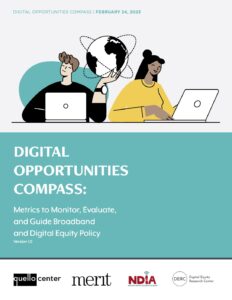 As states across the U.S. develop their digital equity plans this year, as part of the National Telecommunications and Information Administration’s BEAD and DEA grant programs, a comprehensive and holistic framework is needed to evaluate the outcomes and impacts of these federal investments to advance digital equity in the years to come.
As states across the U.S. develop their digital equity plans this year, as part of the National Telecommunications and Information Administration’s BEAD and DEA grant programs, a comprehensive and holistic framework is needed to evaluate the outcomes and impacts of these federal investments to advance digital equity in the years to come.
In response, my colleagues and I have developed a working paper, titled “The Digital Opportunities Compass: Metrics to Monitor, Evaluate, and Guide Broadband and Digital Equity Policy.” The paper was published yesterday by the Quello Center for Media and Information Policy at Michigan State University, where I am a Research Fellow.
Here is a snippet from the Executive Summary of the report:
This working paper introduces a measurement framework to guide state and local policy in the United States at a moment of unprecedented investment in broadband infrastructure and digital equity nationwide. The Infrastructure Investment and Jobs Act of 2021 (IIJA), together with the Digital Equity Act (DEA) included in IIJA, allocated 65 billion dollars to ensure that all Americans have access to affordable, high speed internet service–a prerequisite to achieve broader outcomes, such as ‘economic success, educational achievement, positive health outcomes, social inclusion, and civic engagement.’
The IIJA includes five categories of measurable objectives to assist states in documenting and promoting: (1) the availability of, and affordability of access to, fixed and wireless broadband technology; (2) the online accessibility and inclusivity of public resources and services; (3) digital literacy; (4) awareness of, and the use of, measures to secure the online privacy of, and cybersecurity with respect to, an individual; and (5) the availability and affordability of consumer devices and technical support for those devices. The law is explicit in its goal to ensure that covered populations, or those most impacted by digital inequalities, benefit from these efforts.
The ‘Digital Opportunities Compass’ framework builds on these core metrics and expands them in important ways. It builds on over 25 years of research and experience related to how broadband and device access, affordability, and digital skills relate to digital equity and broader social and development outcomes. This body or experience suggests that digital equity can be achieved more sustainably if the entire broadband ecosystem is considered. The framework is intended to assist stakeholders interested in metrics to monitor, evaluate, and guide broadband and digital equity policy now and in the future.”
Download the full report on the Quello Center’s website.
Update on February, 28, 2023: The Benton Institute for Broadband & Society has published our overview of the report, titled “Digital Opportunities Compass” on their Digital Beat blog.
